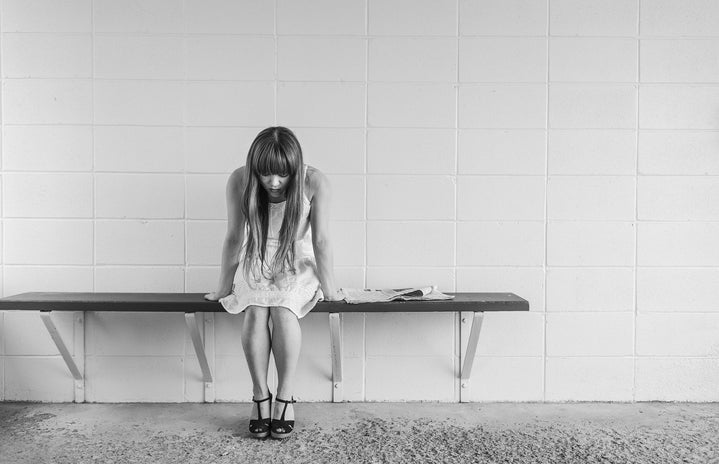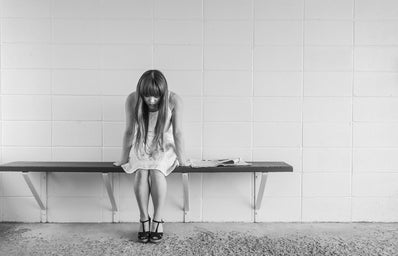As someone who’s struggled with social anxiety for the majority of my life, I’m well-acquainted with loneliness. I’ve spent many a lunch period sitting by myself, with only General Tsao’s Chicken and my beloved Chipwich as petty consolation. I recall writing in my middle school diary how I wished, more than anything, that someone would wave at me in the hallways as I walked to class. How I envied the girls who migrated from class period to class period in clumps, giggling and gossiping about God knows what! I longed to be like them, and yet I hated them with all my heart. They were cliquey, mere clones of one another, and could never grow to understand someone as different, as unique, as…yes, I’ll say the cursed word…quirky as me. I didn’t fit in. I wasn’t like the other girls, I wasn’t like anybody I’d ever met, and although I never said it out loud, I truly did believe that it was because I was better.
Does this narrative sound familiar? That’s because it’s the narrative Gen Z grew up on, the anthem to which we march. Think of Mean Girls, Diary of a Wimpy Kid, Harry Potter, or even The Perks of Being a Wallflower. All of these stories share one common thread, one overarching message: the popular kids are bad. We are taught instead to always root for the underdog, the poor, misunderstood misfits of our world. The goal of these plot lines was to develop empathy in children towards outcasts and to encourage those in socially advantageous positions to advocate for those who were less fortunate, but the end result was quite different. Instead, our generation now aspires to be the outcasts. We have equivocated popularity with evil and loneliness with good. In the words of Ian Fleming, “Loneliness has become a lover, solitude a darling sin.” Why is this so dangerous, you may ask?
Well, for one, our heroes have become anti-heroes. The problem with this is that anti-heroes are the exception, not the rule. So, when the fanbases of these anti-heroes begin to imitate their role models, it is less likely that they themselves will end up being heroes, and far more likely that they will turn into villains. Take the fanbase of Holden Caulfield.
Caulfield is the black sheep of his family, an irresponsible teenager who ran away from his boarding school before his parents could be notified of his expulsion. He is practically friendless and cannot keep a girlfriend, in part because he finds most people to be “phony” and inauthentic, and in part because he is repulsed by girls who buy into hookup culture and casual intimacy. Not only does Caulfield consider himself to be of superior moral character to most girls on the dating scene, but he also considers himself to be of superior moral character to most people in general. The only demographic that holds any place in Caulfield’s heart is children. At one point in the story, the protagonist even says that he wishes he could dedicate his entire life to stopping children from falling off a cliff (hence the name of the book, The Catcher in the Rye). Sounds wholesome enough, right? Maybe so, but the book is now banned in numerous schools and libraries as its protagonist has inspired multiple assassinations, one being that of John Lennon, whose killer believed that he was doing a good deed by getting rid of “phony” people like celebrities. See, in a novel, Caulfield’s extremist views may have seemed well-intentioned enough, but in the real world, hating the world seldom turns out well in the long run.
Fortunately, the damage that characters like Holden Caulfield have caused to our society is not irrevocable, and in recent years, some media outlets have even made an attempt to remedy this issue by showing the dark side of isolation. Interestingly enough, most of these cautionary tales are musicals.
In the musical Beetlejuice, for example, the protagonist Lydia Deets feels misunderstood by everyone besides her deceased mother, which she communicates in her solo “Dead Mom.” A demon then takes advantage of Lydia’s isolation and convinces her to torment her remaining family as a means of coping with her grief. By the end of the show, however, the young heroine realizes her error and decides to embrace what little community she has left, a decision she verbalizes in her final solo, “Home.” The dynamic between Lydia Deets and her demonic accomplice is mirrored in the musical Heathers by Veronica Sawyer and Jason “J.D.” Dean, two misfit teenagers who team up against the popular kids at their academy, a toxic goal that nearly ends in a terrorist attack on the school (this particular example is especially relevant today considering the frequency of school shooting incidents). In both musicals, the takeaway is clear: outsider syndrome, while seemingly benign, can quickly spiral into terrible, terrible things if left unchecked.
That being said, is there any healthy way to navigate feelings of loneliness and isolation?
The truth may seem harsh, but the only healthy way to deal with isolation is to hold ourselves accountable for our circumstances and take personal initiative to step out of our comfort zone to overcome it. For as long as we maintain an external locus of control, our social lives will never improve, but the second we realize that our biggest social inhibition is ourselves, only then can we escape isolation. Regardless of whether you’re an introvert or an extrovert, this is something we all have to do. After all, in the words of Genesis 2:18, “It is not good for man to be alone.”
Now, believe me, I’m the first person to tell you that that’s easier said than done. I spent years of my life unable to order my own food at a restaurant without having a borderline panic attack, much less initiate friendship. I understand that the prospect of overcoming loneliness may seem daunting, but it’s not unmanageable, and we are all better off for it. I’ve experienced firsthand the negative consequences of growing complacent in one’s isolation, and the consequential bitterness that builds up in one’s heart, so I know how important it was for me to change my mindset and actively seek out a community.
So, my one ask of you, dear reader, is to make sure that you find yours.


